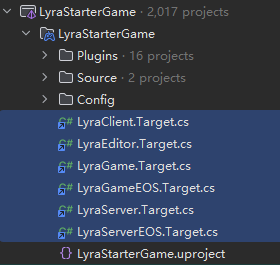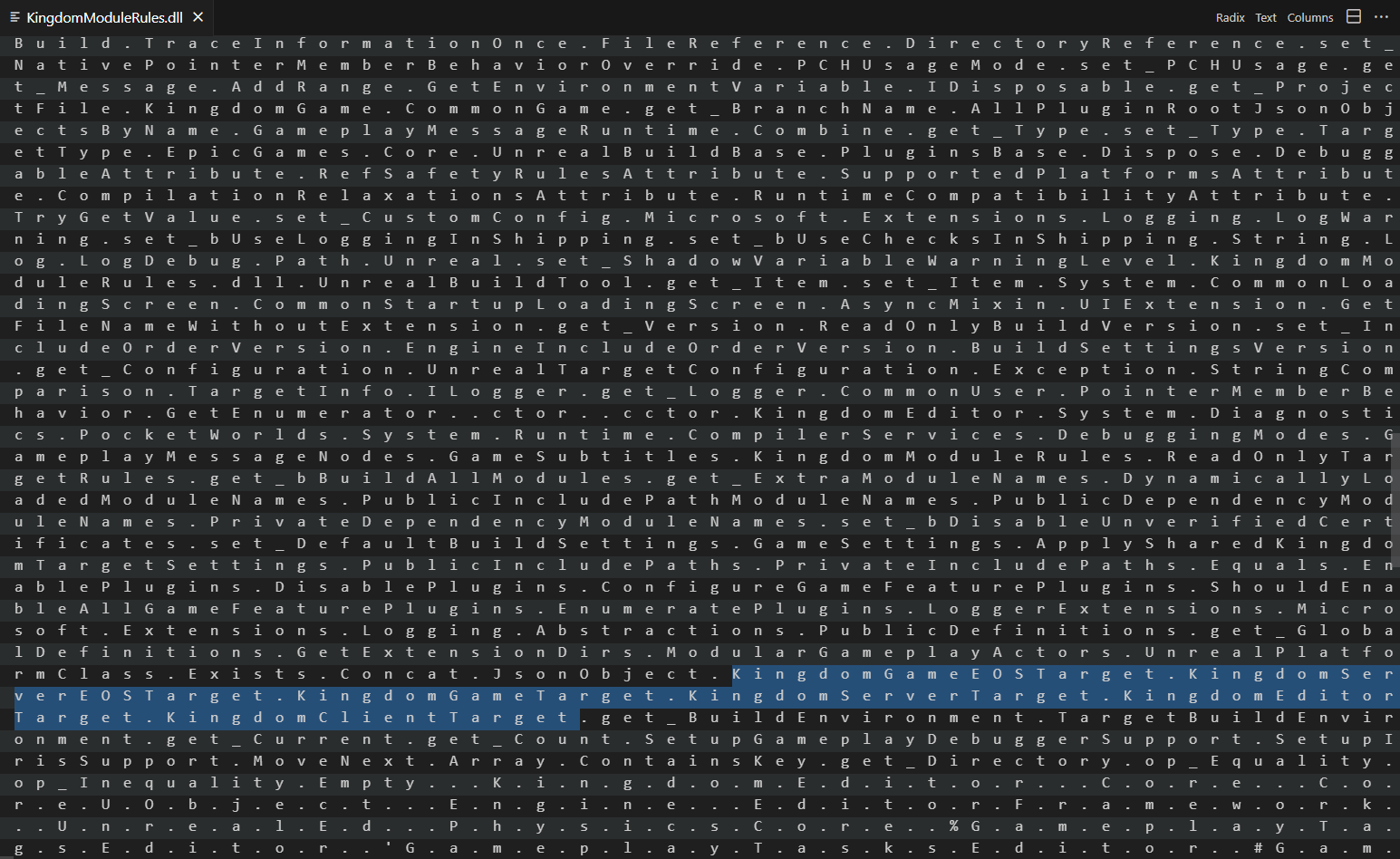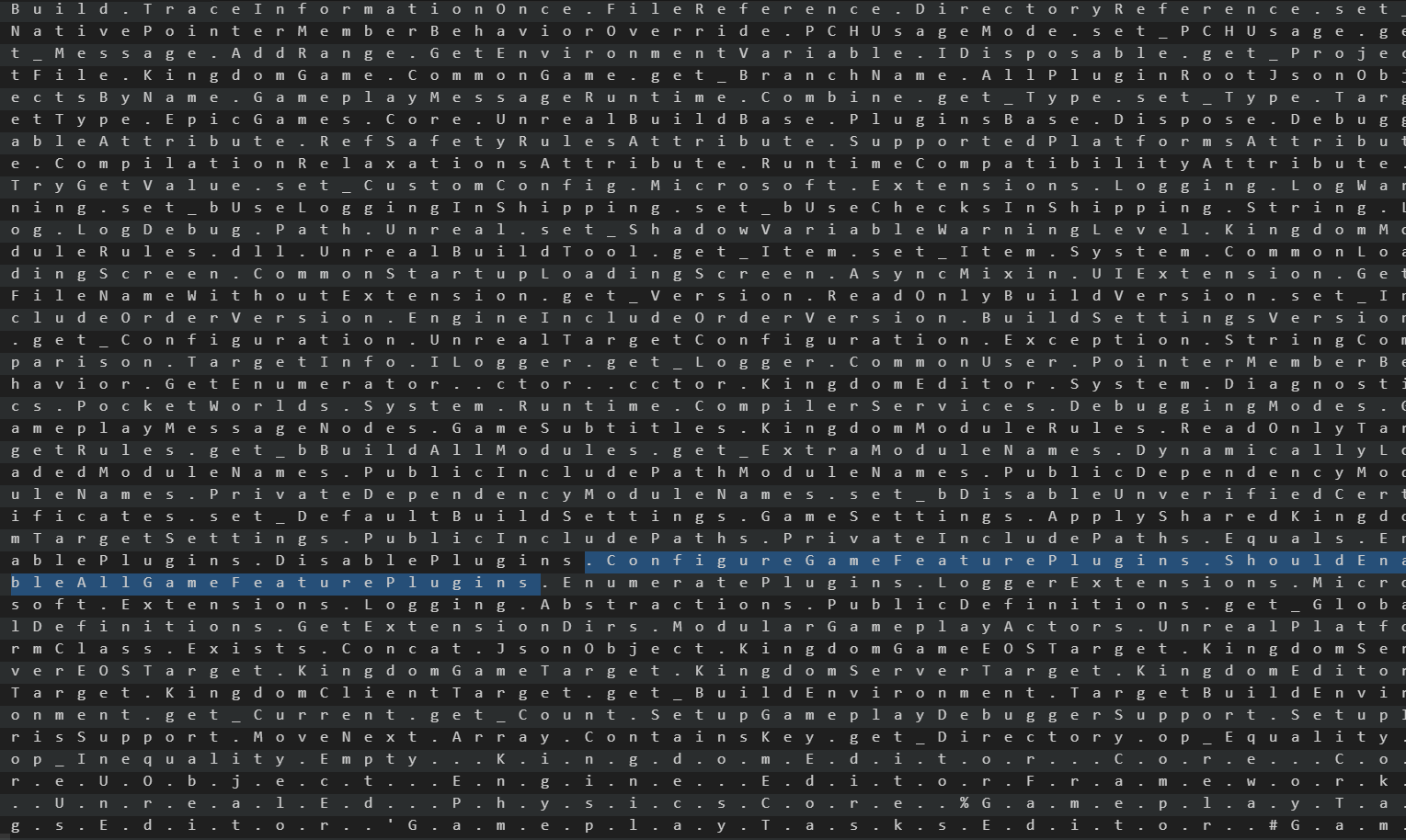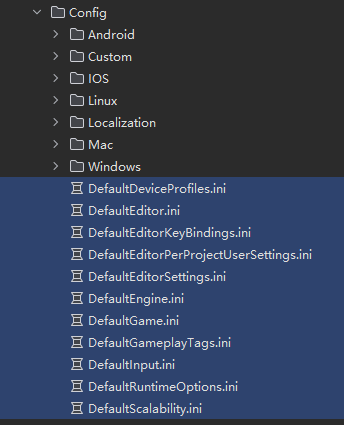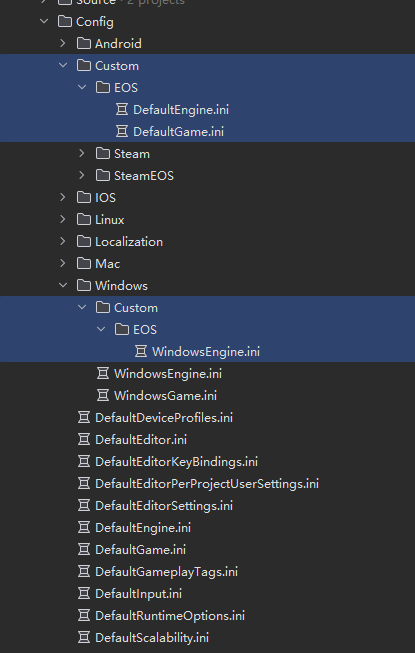Lyra技术解析 - 项目配置
Target.cs, Build.cs, Configs, Modules, 哥们给我干哪来了?
本文内容基于Unreal Engine 5.5.4
如果我犯了错误,请在下面评论并帮助未来的读者!本文中文翻译由AI机翻,可能不够准确或产生一定的阅读困难。
这是一系列关于我从Epic的Lyra项目中学到的知识笔记。该项目声称展示了当前虚幻引擎框架下的最佳实践。其中有些内容是我之前不了解的,有些则已经知晓,但认为仍然值得记录。
Target.cs 和 Build.cs
Target.cs 定义了生成目标时需要将哪些模块包含在构建中。它还定义了目标类型,当 UBT 处理它时,会根据设置生成一个或多个 dll 文件。
对于目标中的每个模块,构建系统会查找它们的 Build.cs 文件,并将其包含在构建过程中。Build.cs 文件定义了模块的依赖关系,同时也配置了模块的设置。
Target.cs 是从全局视角出发,而 Build.cs 则是从单个模块的局部视角出发。
构建目标
只需快速浏览项目结构,我们就能发现Lyra包含6个不同的构建目标。每个目标都有特定用途,可用于以不同方式构建项目。
LyraEditorLyraClientLyraServerLyraServerEOSLyraGameLyraGameEOS
我们将逐一分析这些目标,但会把LyraGame留到最后讨论,因为该文件体量较大且包含大量项目信息。其他目标规模较小,更容易理解。
LyraEditor
这个目标非常直白,LyraEditor用于构建编辑器。它包含LyraGame和LyraEditor模块,同时还启用了用于触屏开发的RemoteSession插件。因此如果我们不使用触屏设备,可以移除这个模块。
1
2
3
4
5
6
7
8
9
10
11
12
13
14
15
16
17
18
19
20
21
22
23
24
// Copyright Epic Games, Inc. All Rights Reserved.
using UnrealBuildTool;
using System.Collections.Generic;
public class LyraEditorTarget : TargetRules
{
public LyraEditorTarget(TargetInfo Target) : base(Target)
{
Type = TargetType.Editor;
ExtraModuleNames.AddRange(new string[] { "LyraGame", "LyraEditor" });
if (!bBuildAllModules)
{
NativePointerMemberBehaviorOverride = PointerMemberBehavior.Disallow;
}
LyraGameTarget.ApplySharedLyraTargetSettings(this);
// This is used for touch screen development along with the "Unreal Remote 2" app
EnablePlugins.Add("RemoteSession");
}
}
目标类型
目标定义的首行是Type = TargetType.Editor;,这是TargetRules类的属性,用于指定我们正在构建的目标类型。可选值包括:
GameEditorClientServerProgram
1
2
3
4
5
6
7
8
9
10
11
12
13
14
15
16
17
18
19
20
21
22
23
24
25
26
27
28
29
30
/// <summary>
/// Static class wrapping constants aliasing the global TargetType enum.
/// </summary>
public static class TargetType
{
/// <summary>
/// Alias for TargetType.Game
/// </summary>
public const global::UnrealBuildTool.TargetType Game = global::UnrealBuildTool.TargetType.Game;
/// <summary>
/// Alias for TargetType.Editor
/// </summary>
public const global::UnrealBuildTool.TargetType Editor = global::UnrealBuildTool.TargetType.Editor;
/// <summary>
/// Alias for TargetType.Client
/// </summary>
public const global::UnrealBuildTool.TargetType Client = global::UnrealBuildTool.TargetType.Client;
/// <summary>
/// Alias for TargetType.Server
/// </summary>
public const global::UnrealBuildTool.TargetType Server = global::UnrealBuildTool.TargetType.Server;
/// <summary>
/// Alias for TargetType.Program
/// </summary>
public const global::UnrealBuildTool.TargetType Program = global::UnrealBuildTool.TargetType.Program;
}
大多数类型都无需解释,但Program类型用于构建独立于引擎或游戏之外的程序。这个类型适用于构建不属于游戏本身的工具或实用程序,例如UnrealFrontend工具。
1
2
3
4
5
6
7
8
9
10
11
12
13
14
15
16
17
18
19
20
21
22
23
24
// Copyright 1998-2018 Epic Games, Inc. All Rights Reserved.
using UnrealBuildTool;
using System.Collections.Generic;
public class UnrealFrontendTarget : TargetRules
{
public UnrealFrontendTarget( TargetInfo Target ) : base(Target)
{
Type = TargetType.Program;
LinkType = TargetLinkType.Modular;
AdditionalPlugins.Add("UdpMessaging");
LaunchModuleName = "UnrealFrontend";
bBuildEditor = false;
bCompileAgainstEngine = false;
bCompileAgainstCoreUObject = true;
bForceBuildTargetPlatforms = true;
bCompileWithStatsWithoutEngine = true;
bCompileWithPluginSupport = true;
bHasExports = false;
}
}
目标依赖与全局依赖的区别
通常我们只需在uproject文件中启用插件,在Build.cs文件中声明依赖,就能在代码中使用该插件。这种操作几乎成为本能,但仔细想想,如果某些依赖仅对特定目标有效,我们本就不需要在一开始引入全局依赖。因此在上例中,我们可以针对特定目标单独启用插件——这里RemoteSession插件仅对LyraEditor目标启用,因为该目标专用于触屏开发。
在非编辑器构建中修改 EnabledPlugins 属性将需要完整重新编译引擎(指Unreal引擎本身而非项目)。换句话说,如果我们直接从Epic Launcher获取的预编译Unreal引擎中向非编辑器构建添加插件,UBT将会报错:Explicitly enabling and disabling plugins for a target is only supported when using a unique build environment (eg. for monolithic game targets)
这是因为要实现此功能,目标必须在一个Unique构建环境(与Shared环境相对)中进行编译,从而允许将 Engine 和 Intermediate 文件编译到项目目录中。但通过Epic Launcher获取的预编译引擎不具备这种能力(我们甚至没有可供编译的源代码),具体参见下文 Unique vs Shared 环境 章节。
1
2
3
4
5
6
7
8
9
10
11
12
13
14
15
16
17
18
19
20
21
22
23
24
25
26
/// <summary>
/// Validates that the build environment matches the shared build environment, by comparing the TargetRules instance to the vanilla target rules for the current target type.
/// </summary>
static void ValidateSharedEnvironment(RulesAssembly RulesAssembly, string ThisTargetName, CommandLineArguments Arguments, TargetRules ThisRules, ILogger Logger)
{
Dictionary<string, (string?, string?)> PropNamesThatRequiredUnique = new();
string? BaseTargetName;
if (ThisRules.RequiresUniqueEnvironment(RulesAssembly, Arguments, PropNamesThatRequiredUnique, out BaseTargetName))
{
throw new BuildException("{0} modifies the values of properties: [ {1} ]. This is not allowed, as {0} has build products in common with {2}.\nRemove the modified setting, change {0} to use a unique build environment by setting 'BuildEnvironment = TargetBuildEnvironment.Unique;' in the {3} constructor, or set bOverrideBuildEnvironment = true to force this setting on.",
ThisTargetName, String.Join(", ", PropNamesThatRequiredUnique.Select(x => $"{x.Key}: {x.Value.Item1} != {x.Value.Item2}")), BaseTargetName, ThisRules.GetType().Name);
}
// Make sure that we don't explicitly enable or disable any plugins through the target rules. We can't do this with the shared build environment because it requires recompiling the "Projects" engine module.
bool bUsesTargetReceiptToEnablePlugins = (ThisRules.Type == TargetType.Editor && ThisRules.LinkType != TargetLinkType.Monolithic);
// programs can enable/disable plugins even when modular
bool bIsProgramTarget = ThisRules.Type == TargetType.Program;
if (!bUsesTargetReceiptToEnablePlugins && !bIsProgramTarget && (ThisRules.EnablePlugins.Count > 0 || ThisRules.DisablePlugins.Count > 0))
{
throw new BuildException(String.Format("Explicitly enabling and disabling plugins for a target is only supported when using a unique build environment (eg. for monolithic game targets). EnabledPlugins={0}, DisabledPlugins={1}",
String.Join(", ", ThisRules.EnablePlugins),
String.Join(", ", ThisRules.DisablePlugins)
));
}
}
注意: 欲在代码中使用插件,我们需要将插件加入
Build.cs的依赖,这样会使得我们的代码静态链接到插件源代码中。但如果我们仅使用插件的蓝图资源或其他内容,则UBT会动态链接插件的dll。这意味着在项目中启用插件和在Build.cs中链接插件是两回事。只要uproject启用了插件并依赖于它,插件内容就会被Cook。
跨目标依赖
最后一行代码较为特殊:LyraGameTarget.ApplySharedLyraTargetSettings(this);。这是在调用LyraGame目标中定义的方法,用于向所有目标应用共享设置。我们稍后会分析该方法的实现,目前只需知道它负责为所有目标配置通用参数。
UBT的运作机制
但这里有个疑问:LyraGameTarget对象从何而来?为何能在不引入头文件的情况下直接调用其函数?要解答这个问题,需要理解UBT(Unreal Build Tool)的工作原理。我们不会深入探讨UBT,简而言之:
UBT会收集所有target.cs文件及模块文件(build.cs),并将它们编译为单一程序集:- 该程序集存储在
Intermediate/Build/BuildRule/LyraModuleRules.dll目录 - 注意:包括插件中的文件在内,所有
server.target.cs、game.target.cs都会被合并到同一个程序集 - 这就是为什么无需引入头文件即可使用
LyraGameTarget——UBT已将其编译至程序集中,LyraEditor能感知LyraGameTarget的存在 - 需要强调的是:将所有目标编译到同一程序集并不等同于构建它们。当构建
LyraEditor.Target.cs时,系统只会检查LyraGame.Build.cs(因其列在ExtraModuleNames中),而LyraServer.Target.cs则完全不会被构建
- 该程序集存储在
但问题仍未解决:为何能直接调用该方法?LyraGameTarget对象实例从何获取?
答案是:我们根本不需要实例。该方法是静态函数,而C#不像C++那样使用::运算符调用静态函数——所有调用都通过.操作符完成。
1
2
3
4
internal static void ApplySharedLyraTargetSettings(TargetRules Target)
{
// ...
}
简要流程如下:
RulesCompiler收集所有文件并创建单一程序集目标RulesAssembly,将这些文件传递给它RulesAssembly编译这些文件并创建单个程序集,其他所有Target.cs在构建期间都能访问该程序集
我知道这听起来难以置信——为什么我的Client目标在构建时能感知ServerEOS目标?但这里有确凿证据(虽然直接进入UBT调试会更简单,但我更想亲眼验证)。以下是反编译后的ModuleRules.dll内容:
确实,所有内容都在这个dll中。客户端、编辑器、服务器、游戏、所有插件等等。不仅如此,我们还能在这个dll中看到ConfigureGameFeaturePlugins函数。
那么它在源代码中的位置呢?就在这里,位于LyraGameTarget类内部。这应该能完美解答我们的疑问。
1
2
3
4
5
6
7
8
// Configures which game feature plugins we want to have enabled
// This is a fairly simple implementation, but you might do things like build different
// plugins based on the target release version of the current branch, e.g., enabling
// work-in-progress features in main but disabling them in the current release branch.
static public void ConfigureGameFeaturePlugins(TargetRules Target)
{
// ...
}
LyraClient
老套路了,理解前面的内容后,这里就没有什么新花样了。
1
2
3
4
5
6
7
8
9
10
11
12
13
14
15
16
// Copyright Epic Games, Inc. All Rights Reserved.
using UnrealBuildTool;
using System.Collections.Generic;
public class LyraClientTarget : TargetRules
{
public LyraClientTarget(TargetInfo Target) : base(Target)
{
Type = TargetType.Client;
ExtraModuleNames.AddRange(new string[] { "LyraGame" });
LyraGameTarget.ApplySharedLyraTargetSettings(this);
}
}
LyraServer
新目标带来新规则,这个目标引入了一个新属性bUseChecksInShipping,用于控制是否在发行版构建中启用检查。虽然主要用于调试,但也可以用来控制发行版的特定功能开关。
1
2
3
4
5
6
7
8
9
10
11
12
13
14
15
16
17
18
19
// Copyright Epic Games, Inc. All Rights Reserved.
using UnrealBuildTool;
using System.Collections.Generic;
[SupportedPlatforms(UnrealPlatformClass.Server)]
public class LyraServerTarget : TargetRules
{
public LyraServerTarget(TargetInfo Target) : base(Target)
{
Type = TargetType.Server;
ExtraModuleNames.AddRange(new string[] { "LyraGame" });
LyraGameTarget.ApplySharedLyraTargetSettings(this);
bUseChecksInShipping = true;
}
}
类似的属性还有:
1
2
3
4
5
6
public bool bUseLoggingInShipping = true ;
public bool bUseChecksInShipping = true ;
// Engine\Source\Runtime\Core\Public\Misc\ Build.h
#define ALLOW_CONSOLE_IN_SHIPPING 1
#define FORCE_USE_STATS 1
实际上可配置的属性远不止这些。自动生成的文档UnrealBuildTool.xml足足有32000行内容,我已将其提交至Github Repo供参考。
Epic 也提供了一大篇关于构建配置的文档 Giant Page
LyraServerEOS & LyraGameEOS & CustomConfig
接近尾声了,这两个目标乍看很简单:它们分别继承自父目标LyraServer和LyraGame,仅新增了一个CustomConfig属性,用于指定目标使用的自定义配置文件。
1
2
3
4
5
6
7
8
9
10
11
12
13
14
15
16
17
18
19
20
21
22
23
24
25
26
// Copyright Epic Games, Inc. All Rights Reserved.
using UnrealBuildTool;
using System.Collections.Generic;
public class LyraServerEOSTarget : LyraServerTarget
{
public LyraServerEOSTarget(TargetInfo Target) : base(Target)
{
CustomConfig = "EOS";
}
}
// Copyright Epic Games, Inc. All Rights Reserved.
using UnrealBuildTool;
using System.Collections.Generic;
public class LyraGameEOSTarget : LyraGameTarget
{
public LyraGameEOSTarget(TargetInfo Target) : base(Target)
{
CustomConfig = "EOS";
}
}
CustomConfig的作用是告知引擎存在自定义配置文件,该文件需要被整合到构建流程中。具体路径定义在以下源码中:
1
2
3
4
5
6
7
8
9
10
11
12
13
inline FConfigLayer GConfigLayers[] =
{
/**************************************************
**** CRITICAL NOTES
**** If you change this array, you need to also change EnumerateConfigFileLocations() in ConfigHierarchy.cs!!!
**** And maybe UObject::GetDefaultConfigFilename(), UObject::GetGlobalUserConfigFilename()
**************************************************/
// ...
// Project/Custom/CustomConfig/Default*.ini only if CustomConfig is defined
{ TEXT("CustomConfig"), TEXT("{PROJECT}/Config/Custom/{CUSTOMCONFIG}/Default{TYPE}.ini"), EConfigLayerFlags::RequiresCustomConfig },
// ...
};
从上面可以看出,除了带有Config元数据的类会读取的配置外,我们还为每个可能的平台准备了配置文件夹,其中就包含这个Custom专用目录。
配置层级
我们立即发现了一个问题:存在多个Custom/EOS文件夹,一个位于根目录,另一个在Windows文件夹内。那么实际使用的是哪个呢?
根据Config Documentation和源码所示,Unreal引擎读取配置的顺序如下:
- Engine/Config/Base.ini
- Engine/Config/Base[Type].ini
- Engine/Config/[Platform]/Base[Platform][Type].ini
- [Project Directory]/Config/Default[Type].ini
- [Project Directory]/Config/Generated[Type].ini
- [Project Directory]/Config/Custom/[CustomConfig]/Default[Type].ini
- Engine/Config/[Platform]/[Platform][Type].ini
- [Project Directory]/Config/[Platform]/[Platform][Type].ini
- [Project Directory]/Config/[Platform]/Generated[Platform][Type].ini
- [Project Directory]/Config/[Platform]/Custom/[CustomConfig]/[Platform][Type].ini
- [User]/Unreal Engine/Engine/Config/User[Type].ini
- [Project Directory]/Config/User[Type].ini
1
2
3
4
5
6
7
8
9
10
11
12
13
14
15
16
17
18
19
20
21
22
23
24
25
26
27
28
29
30
31
32
33
34
35
36
37
38
// See FConfigContext.cpp for the types here
inline FConfigLayer GConfigLayers[] =
{
/**************************************************
**** CRITICAL NOTES
**** If you change this array, you need to also change EnumerateConfigFileLocations() in ConfigHierarchy.cs!!!
**** And maybe UObject::GetDefaultConfigFilename(), UObject::GetGlobalUserConfigFilename()
**************************************************/
// Engine/Base.ini
{ TEXT("AbsoluteBase"), TEXT("{ENGINE}/Config/Base.ini"), EConfigLayerFlags::NoExpand},
// Engine/Base*.ini
{ TEXT("Base"), TEXT("{ENGINE}/Config/Base{TYPE}.ini") },
// Engine/Platform/BasePlatform*.ini
{ TEXT("BasePlatform"), TEXT("{ENGINE}/Config/{PLATFORM}/Base{PLATFORM}{TYPE}.ini") },
// Project/Default*.ini
{ TEXT("ProjectDefault"), TEXT("{PROJECT}/Config/Default{TYPE}.ini"), EConfigLayerFlags::AllowCommandLineOverride },
// Project/Generated*.ini Reserved for files generated by build process and should never be checked in
{ TEXT("ProjectGenerated"), TEXT("{PROJECT}/Config/Generated{TYPE}.ini") },
// Project/Custom/CustomConfig/Default*.ini only if CustomConfig is defined
{ TEXT("CustomConfig"), TEXT("{PROJECT}/Config/Custom/{CUSTOMCONFIG}/Default{TYPE}.ini"), EConfigLayerFlags::RequiresCustomConfig },
// Engine/Platform/Platform*.ini
{ TEXT("EnginePlatform"), TEXT("{ENGINE}/Config/{PLATFORM}/{PLATFORM}{TYPE}.ini") },
// Project/Platform/Platform*.ini
{ TEXT("ProjectPlatform"), TEXT("{PROJECT}/Config/{PLATFORM}/{PLATFORM}{TYPE}.ini") },
// Project/Platform/GeneratedPlatform*.ini Reserved for files generated by build process and should never be checked in
{ TEXT("ProjectPlatformGenerated"), TEXT("{PROJECT}/Config/{PLATFORM}/Generated{PLATFORM}{TYPE}.ini") },
// Project/Platform/Custom/CustomConfig/Platform*.ini only if CustomConfig is defined
{ TEXT("CustomConfigPlatform"), TEXT("{PROJECT}/Config/{PLATFORM}/Custom/{CUSTOMCONFIG}/{PLATFORM}{TYPE}.ini"), EConfigLayerFlags::RequiresCustomConfig },
// UserSettings/.../User*.ini
{ TEXT("UserSettingsDir"), TEXT("{USERSETTINGS}Unreal Engine/Engine/Config/User{TYPE}.ini"), EConfigLayerFlags::NoExpand },
// UserDir/.../User*.ini
{ TEXT("UserDir"), TEXT("{USER}Unreal Engine/Engine/Config/User{TYPE}.ini"), EConfigLayerFlags::NoExpand },
// Project/User*.ini
{ TEXT("GameDirUser"), TEXT("{PROJECT}/Config/User{TYPE}.ini"), EConfigLayerFlags::NoExpand },
};
这很好地解释了不同EOS文件夹的使用方式:Unreal会先加载Custom/EOS文件夹,然后加载Windows/EOS文件夹.
; 不是注释?!
这部分内容来自Epic官方文档,但是在我的测试中,似乎已经不是这么回事了。
从上述文档中,Epic提出了一个有趣的话题:;字符。我们本能地会认为;是注释符号,但实际上并非如此。它”大多数情况下”能像注释一样工作,是因为在解析过程中,FConfigFile::ProcessInputFileContents并不会处理那些不包含=符号来构成键值对的行。因此这些行会被跳过。然而,如果我们遇到这种情况:
1
;A = 1
那么实际上我们定义了一个键为;A,值为1的键值对。因此这是一个有效的配置行,它将会被正常解析。
但是!FConfigFile::ProcessInputFileContents的实现如下:从中我们可以看到它明确检查了;并忽略它。这意味着上面的说法并不成立。
1
2
3
4
5
6
7
8
9
10
11
12
13
14
15
16
17
18
19
20
21
// ...
// ignore [comment] lines that start with ;
if(*Start != (TCHAR)';')
{
// If we're in python mode and the line starts with whitespace
// then we should consider it a part of the prior key
if (File->bPythonConfigParserMode && !CurrentKeyName.IsNone() && FChar::IsWhitespace(*Start))
{
Value = Start;
}
else
{
Value = FCString::Strstr(Start,TEXT("="));
}
}
// Ignore any lines that don't contain a key-value pair
if( Value )
{
// ...
}
LyraGame与共享目标设置
我们终于来到了LyraGame目标,凭借之前的知识,这个文件应该不难理解。除了常规的目标属性外,它还公开了一些静态函数供其他目标使用。由此可见,我们可以将通用目标设置集中管理,避免代码重复。
这里有个有趣的细节:我们可以通过将某台机器的IsBuildMachine环境变量设为1,从而让该机器执行特殊操作,这对DevOps非常实用。尤其适用于那些需要启用所有插件进行测试的构建机器。
1
2
3
4
5
6
7
8
9
10
11
12
13
14
15
16
17
18
19
20
21
22
23
24
25
26
27
28
29
30
31
32
33
34
35
36
37
38
39
40
41
42
43
44
45
46
47
48
49
50
51
52
53
54
55
56
57
58
59
60
// Copyright Epic Games, Inc. All Rights Reserved.
using UnrealBuildTool;
using System;
using System.IO;
using EpicGames.Core;
using System.Collections.Generic;
using UnrealBuildBase;
using Microsoft.Extensions.Logging;
public class LyraGameTarget : TargetRules
{
public LyraGameTarget(TargetInfo Target) : base(Target)
{
Type = TargetType.Game;
ExtraModuleNames.AddRange(new string[] { "LyraGame" });
LyraGameTarget.ApplySharedLyraTargetSettings(this);
}
private static bool bHasWarnedAboutShared = false;
internal static void ApplySharedLyraTargetSettings(TargetRules Target)
{
// ... See Appendix: ApplySharedLyraTargetSettings
}
static public bool ShouldEnableAllGameFeaturePlugins(TargetRules Target)
{
if (Target.Type == TargetType.Editor)
{
// With return true, editor builds will build all game feature plugins, but it may or may not load them all.
// This is so you can enable plugins in the editor without needing to compile code.
// return true;
}
bool bIsBuildMachine = (Environment.GetEnvironmentVariable("IsBuildMachine") == "1");
if (bIsBuildMachine)
{
// This could be used to enable all plugins for build machines
// return true;
}
// By default use the default plugin rules as set by the plugin browser in the editor
// This is important because this code may not be run at all for launcher-installed versions of the engine
return false;
}
private static Dictionary<string, JsonObject> AllPluginRootJsonObjectsByName = new Dictionary<string, JsonObject>();
// Configures which game feature plugins we want to have enabled
// This is a fairly simple implementation, but you might do things like build different
// plugins based on the target release version of the current branch, e.g., enabling
// work-in-progress features in main but disabling them in the current release branch.
static public void ConfigureGameFeaturePlugins(TargetRules Target)
{
// ... See Appendix: ConfigureGameFeaturePlugins
}
}
Monolithic vs Modular Link
如前所述,Target.cs 可能包含一个或多个模块,并最终指引 UBT 生成一个或多个 dll。但具体生成多少个?由谁决定应该是单个还是多个?
要理解这一点,首先需要明确:将所有模块编译到单个 dll 的行为称为 单体型(Monolithic) 链接。这种方式能减少加载时间(只需加载一个dll),但维护性较差——任何修改都需要重新编译整个dll。相反,模块化(Modular) 链接会将每个模块放入独立的程序集,即使它们可能包含相同代码。这种方式允许我们仅重新编译被修改的模块,这是性能与可维护性之间的权衡。
默认情况下,系统会根据当前目标类型自动选择链接方式(除非显式指定)。从源代码可见:
编辑器(Editor) 目标默认采用 模块化链接, 其他所有目标默认采用 单体型链接。这很容易理解:编辑器目标需要 热重载(Hot Reload) 和 实时编码(Live Coding) 等功能,这就要求模块能够独立加载(无需重启编辑器即可重新加载)。而对于 游戏(Game) 目标则不需要这些特性,因此可以直接将所有内容编译到单个dll中。
1
2
3
4
5
6
7
8
9
10
11
12
13
14
15
16
17
18
19
20
21
22
23
24
25
26
27
28
29
30
31
32
33
34
// TargetRules.cs
/// <summary>
/// Specifies how to link all the modules in this target
/// </summary>
[Serializable]
public enum TargetLinkType
{
/// <summary>
/// Use the default link type based on the current target type
/// </summary>
Default,
/// <summary>
/// Link all modules into a single binary
/// </summary>
Monolithic,
/// <summary>
/// Link modules into individual dynamic libraries
/// </summary>
Modular,
}
// -------
/// <summary>
/// Specifies how to link modules in this target (monolithic or modular). This is currently protected for backwards compatibility. Call the GetLinkType() accessor
/// until support for the deprecated ShouldCompileMonolithic() override has been removed.
/// </summary>
public TargetLinkType LinkType
{
get => (LinkTypePrivate != TargetLinkType.Default) ? LinkTypePrivate : ((Type == global::UnrealBuildTool.TargetType.Editor) ? TargetLinkType.Modular : TargetLinkType.Monolithic);
set => LinkTypePrivate = value;
}
Unique vs Shared 环境
我们在前文LyraEditorTarget章节已简单提及:独立(Unique)构建环境需要重新编译引擎,并将引擎二进制文件和中间产物输出到项目目录;而共享(Shared)构建环境则会直接使用引擎目录中的预编译二进制文件和中间产物。这对于单体型构建特别有用——我们不必每次构建项目时都重新编译引擎。
因此很明显,这部分代码会检测当前是否处于共享构建环境。如果用户尝试在共享环境下修改任何与PCH生成相关的配置,系统就会发出警告——因为这些修改根本不会生效。在共享环境中,所有目标都将使用同一套引擎二进制文件和中间产物。
从UBT源码可以看出:只要IsEngineInstalled为true(表示引擎来自Epic启动器安装),构建环境就会被设置为共享;否则将使用独立构建环境。
1
2
3
4
5
6
7
8
9
10
11
12
13
14
15
16
17
18
19
20
21
22
23
24
25
26
27
28
29
30
31
32
33
34
35
36
37
38
39
40
41
42
43
44
45
46
47
48
49
50
51
52
53
54
55
56
57
58
59
60
61
62
63
64
65
66
67
68
69
70
71
72
73
74
75
76
77
78
79
80
81
82
83
84
85
86
87
88
internal static void ApplySharedLyraTargetSettings(TargetRules Target)
{
// ...
if (Target.BuildEnvironment == TargetBuildEnvironment.Unique)
{
// ...
}
else
{
// !!!!!!!!!!!! WARNING !!!!!!!!!!!!!
// Any changes in here must not affect PCH generation, or the target
// needs to be set to TargetBuildEnvironment.Unique
// This only works in editor or Unique build environments
if (Target.Type == TargetType.Editor)
{
LyraGameTarget.ConfigureGameFeaturePlugins(Target);
}
else
{
// Shared monolithic builds cannot enable/disable plugins or change any options because it tries to re-use the installed engine binaries
if (!bHasWarnedAboutShared)
{
bHasWarnedAboutShared = true;
Logger.LogWarning("LyraGameEOS and dynamic target options are disabled when packaging from an installed version of the engine");
}
}
}
}
// TargetRules.cs
/// <summary>
/// Specifies whether to share engine binaries and intermediates with other projects, or to create project-specific versions. By default,
/// editor builds always use the shared build environment (and engine binaries are written to Engine/Binaries/Platform), but monolithic builds
/// and programs do not (except in installed builds). Using the shared build environment prevents target-specific modifications to the build
/// environment.
/// </summary>
[Serializable]
public enum TargetBuildEnvironment
{
/// <summary>
/// Engine binaries and intermediates are output to the engine folder. Target-specific modifications to the engine build environment will be ignored.
/// </summary>
Shared,
/// <summary>
/// Engine binaries and intermediates are specific to this target
/// </summary>
Unique,
/// <summary>
/// Will switch to Unique if needed - per-project sdk is enabled, or a property that requires unique is set away from default
/// </summary>
UniqueIfNeeded,
}
/// <summary>
/// Specifies the build environment for this target. See TargetBuildEnvironment for more information on the available options.
/// </summary>
public TargetBuildEnvironment BuildEnvironment
{
get
{
if (BuildEnvironmentOverride.HasValue)
{
if (BuildEnvironmentOverride.Value == TargetBuildEnvironment.UniqueIfNeeded)
{
throw new BuildException($"Target {Name} had BuildEnv set to UniqueIfNeeded when querying, which means UpdateBuildEnvironmentIfNeeded wasn't called in time");
}
return BuildEnvironmentOverride.Value;
}
if (Type == TargetType.Program && ProjectFile != null && File!.IsUnderDirectory(ProjectFile.Directory))
{
return TargetBuildEnvironment.Unique;
}
else if (Unreal.IsEngineInstalled() || LinkType != TargetLinkType.Monolithic)
{
return TargetBuildEnvironment.Shared;
}
else
{
return TargetBuildEnvironment.Unique;
}
}
set => BuildEnvironmentOverride = value;
}
扩展阅读
Epic 提供了一份全面且出色的Build Documentation,其中详细阐述了构建流程的具体实现细节。
Appendix: ApplySharedLyraTargetSettings
1
2
3
4
5
6
7
8
9
10
11
12
13
14
15
16
17
18
19
20
21
22
23
24
25
26
27
28
29
30
31
32
33
34
35
36
37
38
39
40
41
42
43
44
45
46
47
48
49
50
51
52
53
54
55
56
57
58
59
60
61
62
63
64
65
66
67
68
69
70
71
internal static void ApplySharedLyraTargetSettings(TargetRules Target)
{
ILogger Logger = Target.Logger;
Target.DefaultBuildSettings = BuildSettingsVersion.V5;
Target.IncludeOrderVersion = EngineIncludeOrderVersion.Latest;
bool bIsTest = Target.Configuration == UnrealTargetConfiguration.Test;
bool bIsShipping = Target.Configuration == UnrealTargetConfiguration.Shipping;
bool bIsDedicatedServer = Target.Type == TargetType.Server;
if (Target.BuildEnvironment == TargetBuildEnvironment.Unique)
{
Target.ShadowVariableWarningLevel = WarningLevel.Error;
Target.bUseLoggingInShipping = true;
if (bIsShipping && !bIsDedicatedServer)
{
// Make sure that we validate certificates for HTTPS traffic
Target.bDisableUnverifiedCertificates = true;
// Uncomment these lines to lock down the command line processing
// This will only allow the specified command line arguments to be parsed
//Target.GlobalDefinitions.Add("UE_COMMAND_LINE_USES_ALLOW_LIST=1");
//Target.GlobalDefinitions.Add("UE_OVERRIDE_COMMAND_LINE_ALLOW_LIST=\"-space -separated -list -of -commands\"");
// Uncomment this line to filter out sensitive command line arguments that you
// don't want to go into the log file (e.g., if you were uploading logs)
//Target.GlobalDefinitions.Add("FILTER_COMMANDLINE_LOGGING=\"-some_connection_id -some_other_arg\"");
}
if (bIsShipping || bIsTest)
{
// Disable reading generated/non-ufs ini files
Target.bAllowGeneratedIniWhenCooked = false;
Target.bAllowNonUFSIniWhenCooked = false;
}
if (Target.Type != TargetType.Editor)
{
// We don't use the path tracer at runtime, only for beauty shots, and this DLL is quite large
Target.DisablePlugins.Add("OpenImageDenoise");
// Reduce memory use in AssetRegistry always-loaded data, but add more cputime expensive queries
Target.GlobalDefinitions.Add("UE_ASSETREGISTRY_INDIRECT_ASSETDATA_POINTERS=1");
}
LyraGameTarget.ConfigureGameFeaturePlugins(Target);
}
else
{
// !!!!!!!!!!!! WARNING !!!!!!!!!!!!!
// Any changes in here must not affect PCH generation, or the target
// needs to be set to TargetBuildEnvironment.Unique
// This only works in editor or Unique build environments
if (Target.Type == TargetType.Editor)
{
LyraGameTarget.ConfigureGameFeaturePlugins(Target);
}
else
{
// Shared monolithic builds cannot enable/disable plugins or change any options because it tries to re-use the installed engine binaries
if (!bHasWarnedAboutShared)
{
bHasWarnedAboutShared = true;
Logger.LogWarning("LyraGameEOS and dynamic target options are disabled when packaging from an installed version of the engine");
}
}
}
}
Appendix: ConfigureGameFeaturePlugins
1
2
3
4
5
6
7
8
9
10
11
12
13
14
15
16
17
18
19
20
21
22
23
24
25
26
27
28
29
30
31
32
33
34
35
36
37
38
39
40
41
42
43
44
45
46
47
48
49
50
51
52
53
54
55
56
57
58
59
60
61
62
63
64
65
66
67
68
69
70
71
72
73
74
75
76
77
78
79
80
81
82
83
84
85
86
87
88
89
90
91
92
93
94
95
96
97
98
99
100
101
102
103
104
105
106
107
108
109
110
111
112
113
114
115
116
117
118
119
120
121
122
123
124
125
126
127
128
129
130
131
132
133
134
135
136
137
138
139
140
141
142
143
144
145
146
147
148
149
150
151
152
153
154
155
156
157
158
159
160
161
162
163
// Configures which game feature plugins we want to have enabled
// This is a fairly simple implementation, but you might do things like build different
// plugins based on the target release version of the current branch, e.g., enabling
// work-in-progress features in main but disabling them in the current release branch.
static public void ConfigureGameFeaturePlugins(TargetRules Target)
{
ILogger Logger = Target.Logger;
Log.TraceInformationOnce("Compiling GameFeaturePlugins in branch {0}", Target.Version.BranchName);
bool bBuildAllGameFeaturePlugins = ShouldEnableAllGameFeaturePlugins(Target);
// Load all of the game feature .uplugin descriptors
List<FileReference> CombinedPluginList = new List<FileReference>();
List<DirectoryReference> GameFeaturePluginRoots = Unreal.GetExtensionDirs(Target.ProjectFile.Directory, Path.Combine("Plugins", "GameFeatures"));
foreach (DirectoryReference SearchDir in GameFeaturePluginRoots)
{
CombinedPluginList.AddRange(PluginsBase.EnumeratePlugins(SearchDir));
}
if (CombinedPluginList.Count > 0)
{
Dictionary<string, List<string>> AllPluginReferencesByName = new Dictionary<string, List<string>>();
foreach (FileReference PluginFile in CombinedPluginList)
{
if (PluginFile != null && FileReference.Exists(PluginFile))
{
bool bEnabled = false;
bool bForceDisabled = false;
try
{
JsonObject RawObject;
if (!AllPluginRootJsonObjectsByName.TryGetValue(PluginFile.GetFileNameWithoutExtension(), out RawObject))
{
RawObject = JsonObject.Read(PluginFile);
AllPluginRootJsonObjectsByName.Add(PluginFile.GetFileNameWithoutExtension(), RawObject);
}
// Validate that all GameFeaturePlugins are disabled by default
// If EnabledByDefault is true and a plugin is disabled the name will be embedded in the executable
// If this is a problem, enable this warning and change the game feature editor plugin templates to disable EnabledByDefault for new plugins
bool bEnabledByDefault = false;
if (!RawObject.TryGetBoolField("EnabledByDefault", out bEnabledByDefault) || bEnabledByDefault == true)
{
//Log.TraceWarning("GameFeaturePlugin {0}, does not set EnabledByDefault to false. This is required for built-in GameFeaturePlugins.", PluginFile.GetFileNameWithoutExtension());
}
// Validate that all GameFeaturePlugins are set to explicitly loaded
// This is important because game feature plugins expect to be loaded after project startup
bool bExplicitlyLoaded = false;
if (!RawObject.TryGetBoolField("ExplicitlyLoaded", out bExplicitlyLoaded) || bExplicitlyLoaded == false)
{
Logger.LogWarning("GameFeaturePlugin {0}, does not set ExplicitlyLoaded to true. This is required for GameFeaturePlugins.", PluginFile.GetFileNameWithoutExtension());
}
// You could read an additional field here that is project specific, e.g.,
//string PluginReleaseVersion;
//if (RawObject.TryGetStringField("MyProjectReleaseVersion", out PluginReleaseVersion))
//{
// bEnabled = SomeFunctionOf(PluginReleaseVersion, CurrentReleaseVersion) || bBuildAllGameFeaturePlugins;
//}
if (bBuildAllGameFeaturePlugins)
{
// We are in a mode where we want all game feature plugins, except ones we can't load or compile
bEnabled = true;
}
// Prevent using editor-only feature plugins in non-editor builds
bool bEditorOnly = false;
if (RawObject.TryGetBoolField("EditorOnly", out bEditorOnly))
{
if (bEditorOnly && (Target.Type != TargetType.Editor) && !bBuildAllGameFeaturePlugins)
{
// The plugin is editor only and we are building a non-editor target, so it is disabled
bForceDisabled = true;
}
}
else
{
// EditorOnly is optional
}
// some plugins should only be available in certain branches
string RestrictToBranch;
if (RawObject.TryGetStringField("RestrictToBranch", out RestrictToBranch))
{
if (!Target.Version.BranchName.Equals(RestrictToBranch, StringComparison.OrdinalIgnoreCase))
{
// The plugin is for a specific branch, and this isn't it
bForceDisabled = true;
Logger.LogDebug("GameFeaturePlugin {Name} was marked as restricted to other branches. Disabling.", PluginFile.GetFileNameWithoutExtension());
}
else
{
Logger.LogDebug("GameFeaturePlugin {Name} was marked as restricted to this branch. Leaving enabled.", PluginFile.GetFileNameWithoutExtension());
}
}
// Plugins can be marked as NeverBuild which overrides the above
bool bNeverBuild = false;
if (RawObject.TryGetBoolField("NeverBuild", out bNeverBuild) && bNeverBuild)
{
// This plugin was marked to never compile, so don't
bForceDisabled = true;
Logger.LogDebug("GameFeaturePlugin {Name} was marked as NeverBuild, disabling.", PluginFile.GetFileNameWithoutExtension());
}
// Keep track of plugin references for validation later
JsonObject[] PluginReferencesArray;
if (RawObject.TryGetObjectArrayField("Plugins", out PluginReferencesArray))
{
foreach (JsonObject ReferenceObject in PluginReferencesArray)
{
bool bRefEnabled = false;
if (ReferenceObject.TryGetBoolField("Enabled", out bRefEnabled) && bRefEnabled == true)
{
string PluginReferenceName;
if (ReferenceObject.TryGetStringField("Name", out PluginReferenceName))
{
string ReferencerName = PluginFile.GetFileNameWithoutExtension();
if (!AllPluginReferencesByName.ContainsKey(ReferencerName))
{
AllPluginReferencesByName[ReferencerName] = new List<string>();
}
AllPluginReferencesByName[ReferencerName].Add(PluginReferenceName);
}
}
}
}
}
catch (Exception ParseException)
{
Logger.LogWarning("Failed to parse GameFeaturePlugin file {Name}, disabling. Exception: {1}", PluginFile.GetFileNameWithoutExtension(), ParseException.Message);
bForceDisabled = true;
}
// Disabled has priority over enabled
if (bForceDisabled)
{
bEnabled = false;
}
// Print out the final decision for this plugin
Logger.LogDebug("ConfigureGameFeaturePlugins() has decided to {Action} feature {Name}", bEnabled ? "enable" : (bForceDisabled ? "disable" : "ignore"), PluginFile.GetFileNameWithoutExtension());
// Enable or disable it
if (bEnabled)
{
Target.EnablePlugins.Add(PluginFile.GetFileNameWithoutExtension());
}
else if (bForceDisabled)
{
Target.DisablePlugins.Add(PluginFile.GetFileNameWithoutExtension());
}
}
}
// If you use something like a release version, consider doing a reference validation to make sure
// that plugins with sooner release versions don't depend on content with later release versions
}
}
